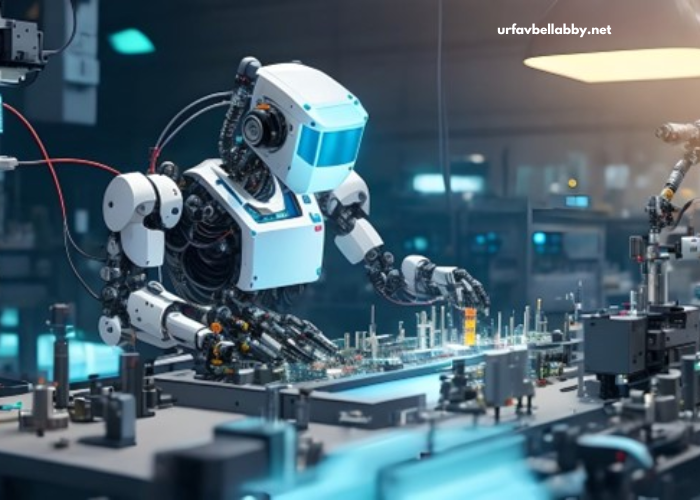Technology has transformed the world at an unprecedented pace, reshaping industries, societies, and the way we interact with our environment. As we look toward the future, we are on the cusp of even more revolutionary breakthroughs. The future of technology promises to bring forth innovations that will not only address existing challenges but also create new opportunities. In this article, we will explore some of the most exciting emerging technology trends that are poised to define the next decade and beyond.
1. Artificial Intelligence (AI) and Machine Learning
AI’s Expanding Role in Everyday Life
Artificial Intelligence (AI) is arguably one of the most transformative technological developments in recent years. AI involves the creation of systems that can mimic human intelligence, enabling machines to perform tasks such as understanding language, recognizing patterns, and making decisions. As AI continues to evolve, it will increasingly play a crucial role in industries ranging from healthcare to transportation.
Machine learning (ML), a subset of AI, allows systems to learn from data and improve over time without human intervention. In the future, AI and ML will become even more ingrained in our daily lives, with applications in everything from personalized recommendations on streaming platforms to autonomous vehicles.
The Rise of Autonomous Vehicles
One of the most anticipated applications of AI is in the development of autonomous vehicles. Self-driving cars are already being tested in various parts of the world, and as AI technology becomes more sophisticated, the prospect of fully autonomous vehicles on the road is becoming a reality. These vehicles promise to reduce traffic accidents, improve fuel efficiency, and offer a new level of convenience for commuters.
2. Quantum Computing
What Is Quantum Computing?
Quantum computing is another emerging technology that has the potential to revolutionize industries. Unlike classical computers, which use bits to process information, quantum computers use quantum bits or qubits. These qubits can exist in multiple states simultaneously, allowing quantum computers to process vast amounts of data much faster than traditional computers.
Potential Impact on Industries
Quantum computing could dramatically change industries such as cryptography, drug discovery, and artificial intelligence. For instance, in cryptography, quantum computers may eventually render current encryption methods obsolete, leading to the development of more secure systems. In the realm of healthcare, quantum computing could accelerate the discovery of new medicines by simulating molecular interactions at unprecedented speeds.
3. 5G Technology
The Promise of Faster Connectivity
5G technology is set to revolutionize the way we connect to the internet. As the fifth generation of mobile network technology, 5G promises to deliver faster download and upload speeds, lower latency, and the ability to connect more devices simultaneously. This next-generation connectivity will enable innovations in areas like the Internet of Things (IoT), augmented reality (AR), and virtual reality (VR).
Transforming Industries with 5G
5G is poised to transform industries such as healthcare, manufacturing, and entertainment. In healthcare, 5G will enable remote surgeries, real-time monitoring of patients, and the use of telemedicine on a larger scale. In manufacturing, 5G will facilitate the integration of IoT devices and enable real-time data analysis, leading to more efficient operations.
4. Augmented Reality (AR) and Virtual Reality (VR)
The Blurring of the Physical and Digital Worlds
Augmented Reality (AR) and Virtual Reality (VR) are technologies that immerse users in a digitally enhanced or entirely virtual environment. AR overlays digital content onto the real world, while VR creates a fully immersive virtual experience. Both technologies are expected to see significant advancements in the coming years, particularly in industries like gaming, education, and healthcare.
Enhancing User Experience with AR and VR
In the entertainment industry, VR is already being used to create immersive gaming experiences, while AR is gaining traction in applications like retail, where customers can visualize products in their homes before making a purchase. In healthcare, AR and VR are being used for medical training, allowing surgeons to practice procedures in a virtual environment before performing them on real patients.
5. The Internet of Things (IoT)
Connecting the World Like Never Before
The Internet of Things (IoT) refers to the growing network of interconnected devices that communicate with each other and share data over the internet. From smart homes to wearable devices, IoT is transforming the way we interact with our environment. In the future, the number of connected devices is expected to grow exponentially, creating new opportunities for innovation and efficiency.
IoT in Smart Homes and Cities
Smart homes are one of the most popular applications of IoT technology. Devices like smart thermostats, voice assistants, and security cameras can be controlled remotely and programmed to interact with each other, offering greater convenience and energy efficiency. Similarly, IoT is poised to play a significant role in the development of smart cities, where data from sensors and devices can be used to optimize everything from traffic flow to waste management.
6. Blockchain Technology
Beyond Cryptocurrencies: Blockchain’s Potential
Blockchain technology, best known for being the underlying system behind cryptocurrencies like Bitcoin, is quickly gaining recognition for its potential to revolutionize various sectors. Blockchain is a decentralized and secure ledger system that can record transactions in a transparent and immutable manner.
While blockchain’s most famous application is in digital currencies, its potential extends far beyond that. In supply chain management, for example, blockchain can be used to track goods as they move through the supply chain, ensuring transparency and reducing the risk of fraud. In the financial sector, blockchain can streamline payments and reduce transaction fees by eliminating intermediaries.
7. Biotechnology and Genetic Engineering
Unlocking the Secrets of Life
Biotechnology and genetic engineering are fields that are rapidly evolving and hold the potential to transform medicine, agriculture, and environmental sustainability. Advances in gene editing technologies, such as CRISPR, have made it possible to modify the genetic makeup of organisms with unprecedented precision.
The Future of Medicine
In medicine, biotechnology is paving the way for personalized treatments and targeted therapies. Gene editing could enable the treatment of genetic disorders and offer potential cures for diseases that were previously considered incurable. Additionally, the use of biotechnology in regenerative medicine is advancing, with stem cell therapies showing promise in healing damaged tissues and organs.
8. Renewable Energy and Sustainability
The Shift Towards Clean Energy
As concerns about climate change continue to grow, renewable energy technologies are expected to play a significant role in the future of technology. Solar, wind, and hydropower are already making substantial contributions to the global energy mix, and innovations in energy storage and grid management are making these sources even more reliable.
Sustainable Tech Innovations
The future of technology is also about sustainability. From electric vehicles to sustainable agriculture practices, technology is being harnessed to reduce humanity’s environmental footprint. Innovations in battery technology, for example, are making it easier to store and use renewable energy, while advances in precision agriculture are helping farmers optimize crop yields and reduce waste.
9. Robotics and Automation
A New Era of Intelligent Machines
Robots and automation have already begun to transform industries like manufacturing, logistics, and healthcare. In the future, robots are expected to become even more sophisticated, capable of performing a wider range of tasks with greater efficiency and precision. The combination of AI, robotics, and automation will drive significant changes across sectors, from assembly lines to customer service.
The Impact on Jobs and Society
While the rise of robots and automation promises increased efficiency and lower costs, it also raises questions about the future of work. As machines take over repetitive and dangerous tasks, there will be a shift in the types of jobs available. Reskilling and upskilling workers will be crucial to ensure that people are prepared for the jobs of the future.
10. Space Exploration and Commercial Space Travel
The Next Frontier
Space exploration is another area where technology is advancing rapidly. With companies like SpaceX and Blue Origin pushing the boundaries of what is possible, commercial space travel could soon become a reality. This would open up new frontiers for exploration, tourism, and even the potential for colonization of other planets.
Technological Advances in Space Exploration
In addition to commercial space travel, technological advancements in satellite technology and space exploration tools are enabling us to learn more about our universe. From advanced telescopes to robotic missions to Mars, the future of space exploration holds endless possibilities for discovery.
Conclusion
The future of technology is full of promise, with emerging trends poised to transform industries, economies, and our everyday lives. From artificial intelligence and quantum computing to renewable energy and space exploration, the innovations on the horizon offer exciting possibilities. While these technologies will undoubtedly present challenges, they also provide an opportunity to address some of the world’s most pressing problems. As we continue to push the boundaries of what’s possible, the future of technology will shape the world for generations to come.





